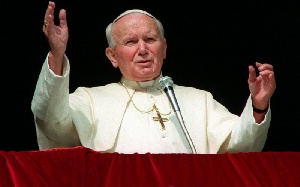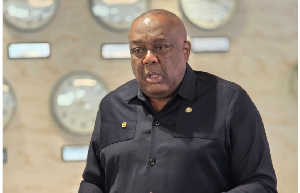1978 is recognized as the year of the three popes.
Today is the 40th anniversary of the election of Pope John Paul II.
On 6 August 1978, Pope Paul VI died.
His successor, Pope John Paul I, on being elected reigned for only 33 days and died.
Then on 16 October 1978, Karol Josef Cardinal Wojtyla, was elected Pope.
He chose the name Pope John Paul II to honour the memory of his predecessor.
Pope John Paul II reigned until his death in April 2005.
Pope John Paul II, visited Ghana in 1980, during the administration of President Hilla Limann, who was a Roman Catholic.
The date of a pope’s pontificate is very significant in the life of the church when the pope is in office; today nobody marks Pope Benedict XVI’s election with a public event or Holy Mass even though he is alive.
But we have chosen to mark this date in history, forty years ago today, for its global significance and most importantly for its lessons in organisational communication.
His Holiness Pope John Paul II was a great PR practitioner, in word and in deed.
The work done by The Second Vatican Ecumenical Council was compiled into a book, Catechism of the Catholic Church, which he signed by virtue of his Apostolic Authority on 11 October 1992.
‘The Catechism of the Catholic Church…which I today order by virtue of my Apostolic Authority, is a statement of the Church’s faith and of Catholic doctrine, attested to or illumined by Sacred Scripture, the Apostolic Tradition and the Church’s Magisterium’.
In this one statement, the pope shows the source of Apostolic Authority in matters of doctrine; a trigradal system, a triumvirate, a three-way test that provided a meticulous and all-inclusive approval process.
The Church bureaucracy had taken 14 years to edit nine draft documents before the complete Catechism of the Catholic Church was ready for papal signature and publication.
The Ecumenical Council for the Vatican (also, The Second Vatican Council; Vatican II) led by ‘the Council Fathers’ had ‘with the help of God… produced doctrinal statements for the ‘renewal of thought, action, practices and moral virtue’.
What do the terms “Ecumenical” and “The Church Fathers” repeated throughout the pope’s text suggest to us?
Does this Catholic document’s preparation have any relevance within the context of our national development agenda?
Are there any important lessons?
The word ecumenism suggests that the Catholic Church at Vatican II sought to promote a tolerant and more inclusive Christian church that welcomed other denominations; strident dogmatism had been toned down.
This means clearly that we have to do away with entrenched ideological positions and aggressive partisan colourings.
If only we will look at our official documents, policy papers, the wording of our press releases, and make them more “ecumenical” then we can have a more inclusive and tolerant society; more Galileos and more alleged witches will be saved.
‘Church Fathers’ is clear; it symbolises the benefit of learning from those who know and can guide through reason; those with genuine proven expertise without calling them “Too Known”.
Are there any ‘Church Fathers’ equivalent in Ghana?
When their names are suggested for advice and consultation, will we have the humility and or patriotic fervour to meet and listen to them or shall we dismiss them in an off-handed manner with braggadocio and chest thumping…often with a dash of pernicious partisanship?
Do we not have the ‘Church Fathers’ equivalent in teaching, banking, nursing, management, medicine, law, military service, engineering…and PR, yes PR?
Many Management and PR students in Ghana have a strong aversion to bureaucracy on account of the deliberate bottlenecks Ghanaian public officials, and I dare say even private companies, ‘engineer’ to frustrate an approval process.
But it was the sociologist Max Weber who observed that bureaucracy was created to solve existential problems.
Does the process of consultation mean anything for the Ghanaian political and business establishment?
Will they have their say, and we will have our way?
Someone please talk to me about a national development plan or reference document for Ghana.
Our Vision 2020 document – where is it?
Poverty Reduction and Growth Strategy I and II- where is it?
There was even a Ghana 2057 plan developed in 2007 and highly promoted by Kwadwo Baah-Wiredu, the then minister for finance – where is it?
Our “Order from Above” attitude, the oral instructions syndrome whereby small fry myopic allies of persons in political and business office, frighten colleagues with transfers and dismissals, has done a lot of harm and damaged the well-oiled bureaucratic system established in the colonial and immediate post-Independence era.
How many of us today will even attempt to apply to the Scholarship Secretariat for assistance?
Has that office become part of the spoils of whichever party is in power?
In the current malodorous banking scandal and the embarrassing lapses in our organisational and corporate behaviour, PR practitioners, HR practitioners, marketers, managers and accountants have all tended to blame some other person for their shortcomings.
Where do you derive your authority from and who do you answer to?
Where and how did the Ecumenical Council derive its authority?
Do you have an editorial committee or consultant or trusted objective taskmaster – a disinterested mentor who looks at your official documents?
In my favourite Tom and Jerry Goes to Mars cartoon series, I never forget the words, ‘Things don’t just go kabluey; things go kabluey for a reason’.
Or as my mentor will always remind me, ‘There is method to the madness; things must be done properly’.
This is PR; His Holiness John Paul II’s Apostolic Constitution, certainly teaches us valuable lessons in organisational communication.
We shall never forget him.
Email: ato@writersghana.com
Opinions of Tuesday, 16 October 2018
Columnist: Isaac Ato Mensah















